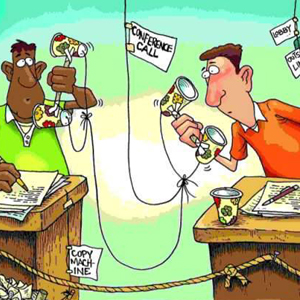Good communication skills and report writing techniques are important and indispensable tools for small business managers, business executives and anyone in a leadership position. It is difficult to see any successful event, project and even relationships that are not built on good communication skills.
Communication is sending and receiving information between two or more people. The person sending the message is referred to as the sender, while the person receiving the information is called the receiver. The information conveyed can include facts, ideas, concepts, opinions, beliefs, attitudes, instructions and even emotions.
Types of Communication commonly use in Organizations
Methods of communication vary, and you are almost certainly familiar with all of them. Let’s take a look at some of the primary methods.
- Verbal communication is simply sending a message through a spoken language that is understood by both the sender and receiver of the message. Examples of verbal communications include face-to-face talking, listening to a lecture or seminar, and listening to a television program. In fact, if you are listening to this lesson, you are engaged in a verbal form of communication.
- Written communication is sending a message by the use of symbols that are understood by both the sender and receiver of the message.
COMMUNICATION AS A MANAGERIAL TOOL
Communication plays major roles in organisations 99 percent of activities done is organised settings is done through communication therefore communication remain most useful tool of business management. Communication has been identified as a powerful persuader and initiator of actions, yet many managers fail to communicate. Sometimes managers and business executives do not write clear and lucid reports and instructions. While some managers, leaders and business executives refuse to communicate effectively due to fear, selfish dispositions and hidden motives.
There are small business managers that have the desire to communicate but lack the training and confidence to do so.
In order to overcome these problems, business managers as communicators must observe the following principles:
- Organization: Poor organization of communication can cause communication breakdown. You must organize your report, bearing in mind your message, the purpose and your audience.
- Standard Formats: Generally speaking, it is good to stick with accepted formats. This allows for easy understanding of the report. First present the subject matter and then the key points.
- Be Specific: Some managers use general terms in their report hoping that the receiver will understand. When he/she fails to understand, communication breaks down. For example, saying plant instead of oil refinery, unfavourable weather instead of rainfall.
- Define your topic: Effective communication starts with a clear definition of the specific topic you want to handle. Many managers make a mistake of tackling topics without first defining them to create common understanding.
- Avoid wordy prose: One mistake some of us make is to assume that you are impressing people when you make wordy write-ups. Wordy prose tends to mar the objective of the subject matter so precise and distinct words should be used.
- Avoid Corporatese: Corporatese is a writing style that leaves your language sounding high without an easily assignable meaning. For example the project has reached its utmost crescendo.
- Know your Reader: Written communication is most effective when it is targeted and personal. Your writing should be built around the needs or interests of the reader. Therefore a fair background knowledge of your reader, his job title etc will be an advantage.
- Chronological Order: Present your points in the order in which they happened. This makes your report to flow and arouse the interest of the reader or the instructor.
QUALITIES OF A GOOD COMMUNICATOR
A good communicator must possess certain attributes:
- Good analyst—He /She must analyze the information coming to him in the light of the subject matter.
- Good listening skills–Listening makes you to gather enough information about a matter of interest.
- He/She must be able to put down his/her ideas in clear and lucid form in a good grammar.
Good communication skills is very important and an indispensable tools for small business managers, business executives and anyone in a leadership position. It is difficult to see any successful business, project and relationships that are not built on good communication skills. As for business, communication within and outside organisation must be effective.







